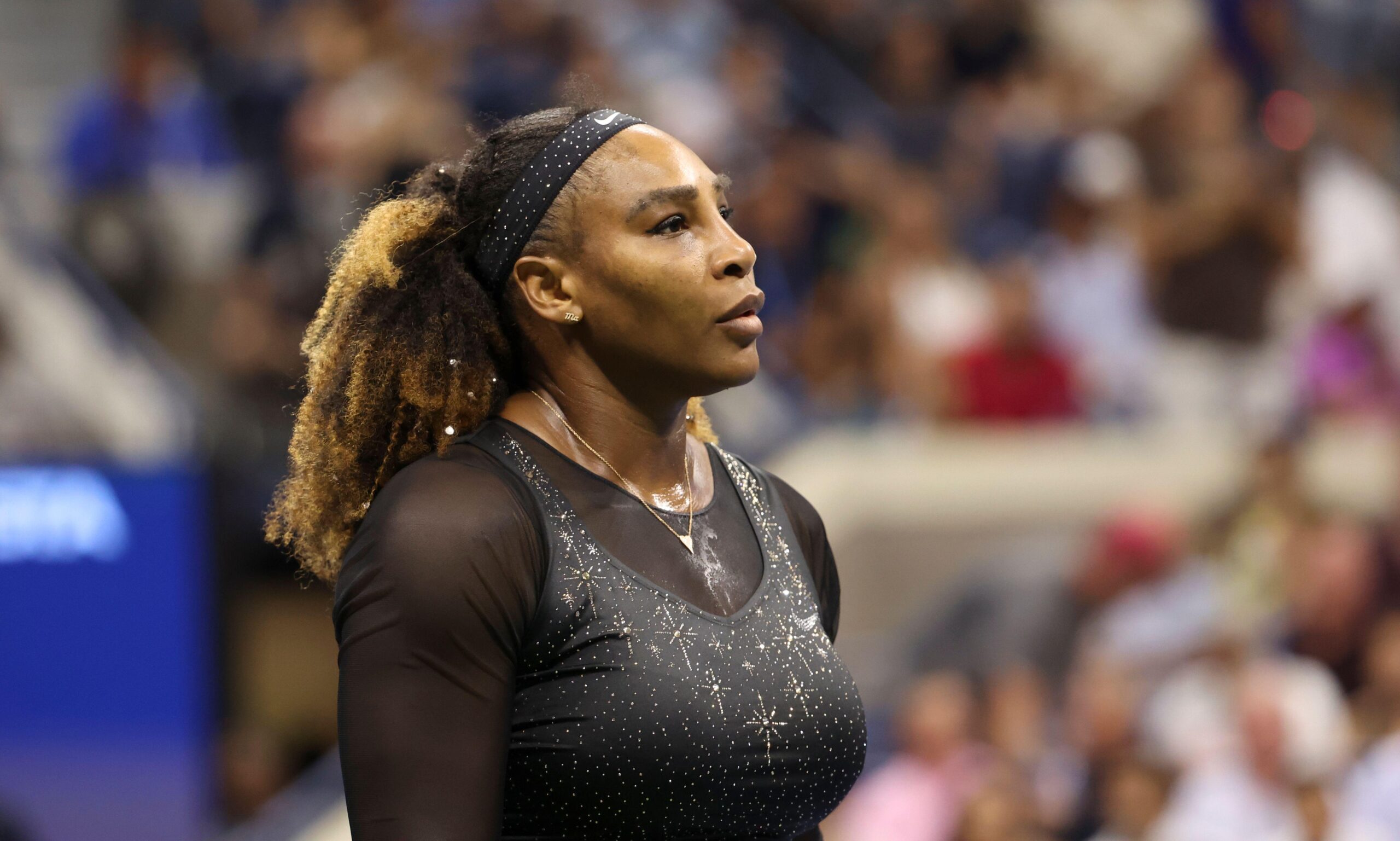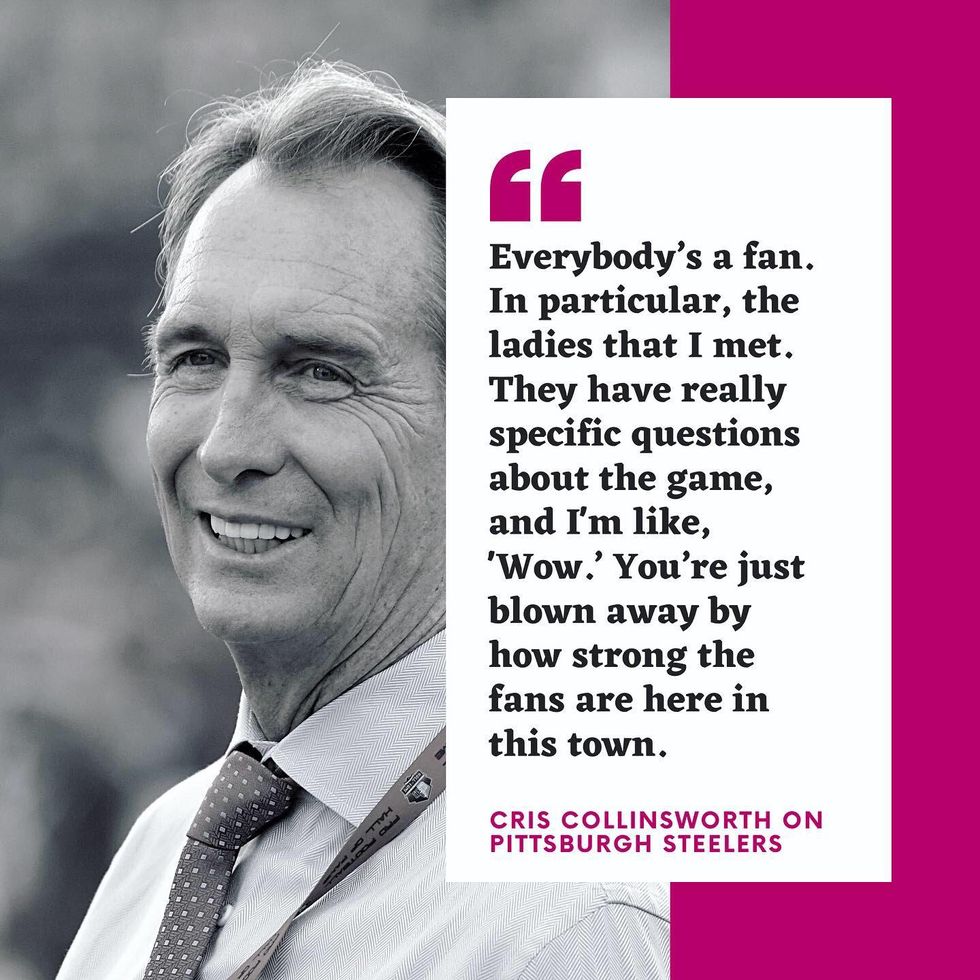
JEAN CATUFFE/DPPI/Shutterstock
On December 2nd, the Baltimore Ravens and Pittsburgh Steelers played against one another in a rugged divisional matchup. Millions of Americans tuned in as announcer Cris Collinsworth intended to pay a compliment to an impressive group of Steelers fans he met. They just so happened to be women.
“Everybody’s a fan. In particular, the ladies that I met,” Collinsworth said, seemingly surprised by the fact that some women are knowledgeable about sports. “They have really specific questions about the game, and I’m like, ‘Wow.’ You’re jus blown away by how strong the fans are here in this town.”
 Cris Collinsworth on Pittsburgh Steelers fans from a December 2nd broadcast. Via FindBet Instagram
Cris Collinsworth on Pittsburgh Steelers fans from a December 2nd broadcast. Via FindBet Instagram
While Collinsworth apologized and clarified that he knows “first hand how much harder [female journalists] have to work harder than any of us in this industry,” it is still remarkable to many that there are knowledgeable, die-hard female fans of America’s major sports.
As a female NFL fan, fantasy football player, and journalist, I’ve personally experienced the ways in which women experience football differently in America. From Cam Newton’s surprise that a female journalist could criticize his game decisions to chalking up a woman’s success to appearances, there are various ways in which women in sports are limited, challenged and delegitimized on a regular basis.
It should be noted that the overwhelming majority of male journalists champion and support female colleagues, treating them with equality, respect, and inclusion that would make any feminist proud.
Aside from Collinsworth’s poorly worded comment, most gendered vitriol comes from online trolls and sports fans — but this should still be noted because it’s something no professional should ever have to deal with because of their gender. If you follow Katie Nolan on Twitter, you’ve likely seen exactly what I’m talking about. If not, here are a few distinct ways in which women in the sports world are viewed differently than their male counterparts.
Women aren’t expected to know X’s and O’s.
This was the nerve Collinsworth’s comment unintentionally struck, and it explains why so many women in the sports world were irked by it: So often, male fans and even athletes question our knowledge of the sport.
Cam Newton did this back in 2017, when Charlotte Observer reporter Jourdan Rodrigue asked Newton about one of his receivers embracing the physicality of his routes.
Newton’s response? Incredulous, dismissive laughter.
“It’s funny to hear a female talk about routes like — it’s funny.”
According to Rodrigue, she spoke with Newton privately after the press conference and somehow, it was even worse.
Building into a separate point, female sports journalists have traditionally been expected to pitch softball questions or inquire about a player’s personal life and backstory, which partially explains why Newton didn’t expect a woman to ask him about receiver routes.
While there are many female journalists who continue to pursue human interest sports stories, there are increasingly more women in sports data analytics and game analysis. Even better, there are women like myself who now experience the freedom and support to report on race and identity in sports, while also writing about using NFL draft data to analyze wide receiver traits.
Unfortunately, our cultural perception of women in sports hasn’t fully caught up with reality.
Here’s a friendly reminder for anyone who doesn’t know: You don’t need to play a sport to be an expert at analyzing it. Last time I checked, Skip Bayless, Stephen A. Smith, and hundreds of other men reporting on various sports never went pro and will never understand it from a professional perspective. None of this lessens their ability to watch and understand the game.
While they don’t have the personal experience of playing football, female journalists are perfectly capable of analyzing the sport, combing through data and scouting which athletes will find professional success — and if they want to shoot from the hip with hot sports takes, they should be able to do so without assuming their ignorance is due to their gender.
Max Kellerman FINALLY admits: ‘I was wrong, Tom Brady never fell off a cliff’ | First Takewww.youtube.com
We’re still waiting to fall off Max Kellerman’s Brady cliff/plateau — no matter the gender, sometimes the best of us have no idea what the hell is going on. The idea that it’s just women who don’t get sports is really what’s funny, Cam.
While there are thousands of female sports journalists, many of them have had specific roles carved out for them that encourage harmful stereotypes about women.
As mentioned above, Cam’s surprise is in part due to the fact that for decades women were rarely asking about receiver routes — they’ve been relegated to sideline reporters or left to quietly mediate sports talk shows between obnoxious opinions about the game.
Make no mistake — there is absolutely nothing wrong with choosing these roles, as many female sports journalists continue to do. The problem is with pigeonholing women into them, creating limited spaces for women in the industry where “feminine” qualities are more desired.
Women have long been praised for their ability to empathize and maintain the peace, which although positive, is a harmful stereotype that reinforces the expectation that women should shoulder the burden of emotional labor. In alignment with this stereotype, sideline reporters ask players how they feel after games, while talk show mediators quiet loud personalities and transition between storylines.
For genuine gender parity, there should be an even mix of men and women in every journalistic role. Amazon Prime did something incredible with their all-women announcer team of Andrea Kramer and Hannah Storm (which is an enjoyable stat-filled listen, by the way), but this should be more common than it actually is.
Women in sports are judged critically for their appearance, both positively and negatively: They’re either called “ugly” or are overtly sexualized.
Women still stand out as sporty comedians and commentators, and while thousands of men and women support gender parity in sports journalism, there are still millions of fans who hold back progress with the harmful assumption that the accomplishments of women have to do with their bodies rather than their brains.
If you’re a fan of Colin Cowherd’s show, then you may be familiar with his co-host, Joy Taylor. And if you’re familiar with the YouTube comments section, you won’t be surprised that any video involving Joy Taylor includes rampant sexual comments on her appearance.
Colin Cowherd gets FRIEND ZONED by Joy Taylor – Part 2 (Subscribe my darlings)www.youtube.com
At one point or another, every female broadcaster has been or will likely be subjected to unwarranted sexual harassment due to their appearance. As I mentioned in a broadcast with fellow female sports journalist Ashmere Prasad, I was sent shirtless pictures of a male sports fan I didn’t know, without reason or provocation. And when I reacted negatively to this, the guy unliked my page, which is rather mild compared to the rage-filled reactions many female sports journalists experience when they reject male advances.
If disgust about this treatment seems like an overreaction, keep in mind that this behavior has very real and dangerous consequences. Legendary ESPN broadcaster Erin Andrews, a trailblazer who continues to be a powerful role model for so many aspiring female sports journalists, was unknowingly stalked in a horrific 2008 incident. A man named Michael David Barrett rented hotel rooms next to Andrews and filmed her nude through peepholes on multiple occasions, later releasing them online.
So many people let Andrews down along the way: a Nashville hotel apparently released which room she was staying in to the convict, and the FBI was only convinced she wasn’t pulling a publicity stunt after she vomited from reliving the trauma.
While Andrews undoubtedly is protecting herself more carefully these days, the bottom line is that she shouldn’t have to. Erin Andrews shouldn’t experience violating trauma and pain because she is a woman in the national spotlight.
Andrews’s deeply troubling experience, along with the experiences of the millions of women who experience online gender-based harassment regularly, is proof that women remain targets of perverted men, both online and in real life.
The achievements of female sports journalists are diminished because of their gender.
When men in the sports world aren’t laughing at or gawking at female sports journalists, they often resort to another popular tactic: belittling their accomplishments by implying they were never rightfully gained.
In a world that is trying to veer away from reserving power for a privileged few, people who previously did not have a seat at the table are now being empowered and valued for their voices. Some people don’t like that.
During our Popdust broadcast, Ashmere brought to my attention the experience of Jessica Kleinschmidt. Jessica Kleinschmidt is a Digital/MLB Reporter for NBC Sports Bay Area. She’s also the host of NBC Sports’ Balk Talk, and the co-host of the Cork’d Up podcast alongside Rachel Luba, an MLB player agent and attorney.
Despite all of the incredible work Kleinschmidt has done, despite how hard she has worked to get there, her accomplishments are diminished because some guy on the internet thinks she is where she is because “someone wants to f*** her.”
Reminder to women in this industry who work hard that this is still what I’m dealing with after establishing myself… https://t.co/FK4NTRBhOp— Jessica Kleinschmidt (@Jessica Kleinschmidt) 1607141785
Kleinschmidt says something telling in her tweet: This is still what she is dealing with after establishing herself in a tough industry. Still.
No matter what Kleinschmidt or other female sports journalists do or say or think, there remain people who send hateful messages about how they’ve moved forward in the field because of their appearance or because they’re a “diversity pick.” Because they’re women.
Yet, as previously mentioned — as Cris Collinsworth made clear himself — people are still surprised when women know a little something about sports.
But that’s what it is to be one of the #WomenInSports: It is a duality of being pushed down and lifted up solely because of our gender.
Women are held back from specific roles.
We’re used to fill specific ones.
We may be used to boost ratings because we’re physically desirable.
Yet we’re stalked and harassed by men, both online and in real life.
And for the few of us that actually “make it in this industry,” no matter what we do, there will always, always be someone to say, “You’re only valued because you’re a woman.”
Go ahead and say that to me again, bro. We all know what this really is: you’re just mad that you don’t get paid for your unimaginative sports takes.
In the immortal words of SB Nation Grizzlies writer Molly Morrison, “I’m sitting courtside at an NBA game covering the team I grew up watching, you’re sitting on your mom’s couch making sexist jokes on twitter. We are not the same.”














